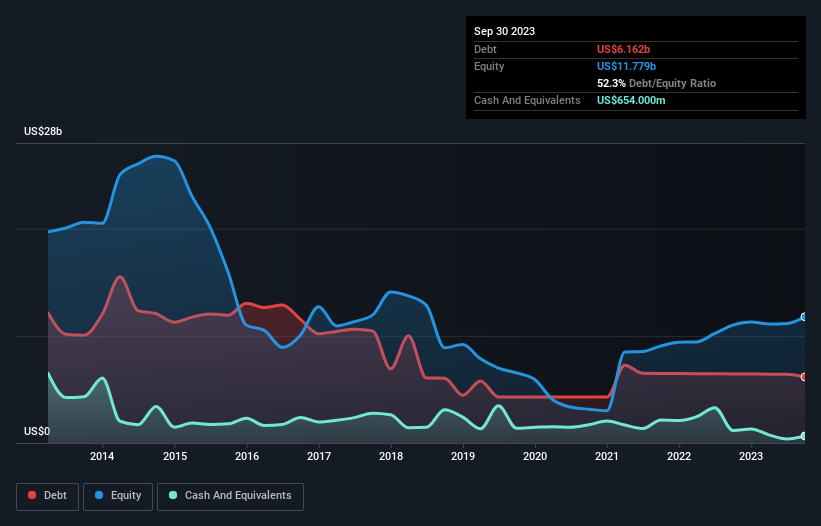- United States
- /
- Oil and Gas
- /
- NYSE:DVN
These 4 Measures Indicate That Devon Energy (NYSE:DVN) Is Using Debt Extensively

Legendary fund manager Li Lu (who Charlie Munger backed) once said, 'The biggest investment risk is not the volatility of prices, but whether you will suffer a permanent loss of capital.' It's only natural to consider a company's balance sheet when you examine how risky it is, since debt is often involved when a business collapses. As with many other companies Devon Energy Corporation (NYSE:DVN) makes use of debt. But the more important question is: how much risk is that debt creating?
When Is Debt A Problem?
Debt assists a business until the business has trouble paying it off, either with new capital or with free cash flow. If things get really bad, the lenders can take control of the business. However, a more common (but still painful) scenario is that it has to raise new equity capital at a low price, thus permanently diluting shareholders. Of course, plenty of companies use debt to fund growth, without any negative consequences. The first step when considering a company's debt levels is to consider its cash and debt together.
See our latest analysis for Devon Energy
What Is Devon Energy's Debt?
You can click the graphic below for the historical numbers, but it shows that Devon Energy had US$6.16b of debt in September 2023, down from US$6.45b, one year before. However, it also had US$654.0m in cash, and so its net debt is US$5.51b.

A Look At Devon Energy's Liabilities
Zooming in on the latest balance sheet data, we can see that Devon Energy had liabilities of US$3.33b due within 12 months and liabilities of US$9.13b due beyond that. On the other hand, it had cash of US$654.0m and US$1.85b worth of receivables due within a year. So its liabilities outweigh the sum of its cash and (near-term) receivables by US$9.96b.
This deficit isn't so bad because Devon Energy is worth a massive US$27.8b, and thus could probably raise enough capital to shore up its balance sheet, if the need arose. But it's clear that we should definitely closely examine whether it can manage its debt without dilution.
In order to size up a company's debt relative to its earnings, we calculate its net debt divided by its earnings before interest, tax, depreciation, and amortization (EBITDA) and its earnings before interest and tax (EBIT) divided by its interest expense (its interest cover). This way, we consider both the absolute quantum of the debt, as well as the interest rates paid on it.
Devon Energy has a low net debt to EBITDA ratio of only 0.73. And its EBIT easily covers its interest expense, being 15.7 times the size. So we're pretty relaxed about its super-conservative use of debt. In fact Devon Energy's saving grace is its low debt levels, because its EBIT has tanked 39% in the last twelve months. When a company sees its earnings tank, it can sometimes find its relationships with its lenders turn sour. The balance sheet is clearly the area to focus on when you are analysing debt. But ultimately the future profitability of the business will decide if Devon Energy can strengthen its balance sheet over time. So if you're focused on the future you can check out this free report showing analyst profit forecasts.
Finally, a company can only pay off debt with cold hard cash, not accounting profits. So it's worth checking how much of that EBIT is backed by free cash flow. Looking at the most recent three years, Devon Energy recorded free cash flow of 47% of its EBIT, which is weaker than we'd expect. That weak cash conversion makes it more difficult to handle indebtedness.
Our View
Devon Energy's EBIT growth rate and level of total liabilities definitely weigh on it, in our esteem. But the good news is it seems to be able to cover its interest expense with its EBIT with ease. Looking at all the angles mentioned above, it does seem to us that Devon Energy is a somewhat risky investment as a result of its debt. That's not necessarily a bad thing, since leverage can boost returns on equity, but it is something to be aware of. There's no doubt that we learn most about debt from the balance sheet. However, not all investment risk resides within the balance sheet - far from it. For example Devon Energy has 3 warning signs (and 1 which is significant) we think you should know about.
If, after all that, you're more interested in a fast growing company with a rock-solid balance sheet, then check out our list of net cash growth stocks without delay.
New: Manage All Your Stock Portfolios in One Place
We've created the ultimate portfolio companion for stock investors, and it's free.
• Connect an unlimited number of Portfolios and see your total in one currency
• Be alerted to new Warning Signs or Risks via email or mobile
• Track the Fair Value of your stocks
Have feedback on this article? Concerned about the content? Get in touch with us directly. Alternatively, email editorial-team (at) simplywallst.com.
This article by Simply Wall St is general in nature. We provide commentary based on historical data and analyst forecasts only using an unbiased methodology and our articles are not intended to be financial advice. It does not constitute a recommendation to buy or sell any stock, and does not take account of your objectives, or your financial situation. We aim to bring you long-term focused analysis driven by fundamental data. Note that our analysis may not factor in the latest price-sensitive company announcements or qualitative material. Simply Wall St has no position in any stocks mentioned.
About NYSE:DVN
Devon Energy
An independent energy company, engages in the exploration, development, and production of oil, natural gas, and natural gas liquids in the United States.
Very undervalued with adequate balance sheet.


